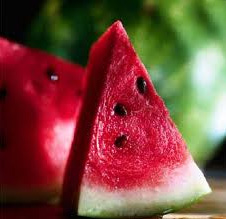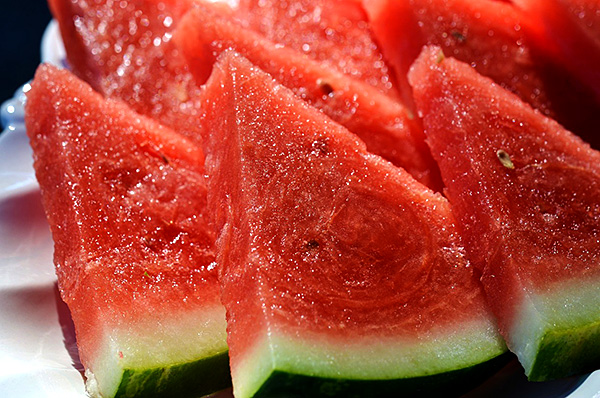Tasty, juicy, inexpensive, readily available, red watermelon is not just a food but a tremendous natural product. In China or Japan is customary that when you are invited to dinner, in the form of a gift, instead of the usual bottle of wine, a watermelon is given. This usually confirms the importance it has in the diet, and for good health.
Not fruit, but vegetable, closely related to pumpkins and cucumber, watermelon is recommended for all except people with kidney failure.
Its core is a veritable cocktail of water (about 95%) and natural sugars. Enzymes and organic acids contained mostly near the skin have strong detoxification effect. But watermelon is the leading provider of lycopene, a substance with antioxidant and immune regulator. The level of lycopene content of watermelon is bigger than the tomatoes. Thus, two cups of watermelon juice contains 18.16 mg of lycopene on average, and a tomato of medium size contains only 4 mg.
Red watermelon cure, a cure of the season:
All properties listed above recommends watermelon for treating many kinds of diseases. A course of less than ten days has the effect of detoxification, hormonal and immune regulation. It is recommended for people with a high degree of wear of the body, the elderly or those who had or have a diet loaded with toxins. Diet requires consumption of at least two pounds of watermelon a day. Because it requires no further preparation, diet is very easy to follow.
Some therapists and physicians recommend the watermelon juice, but it oxidizes very quickly and loses in less than 15 minutes its curative potential. As such, it is recommended the normal consumption of watermelon. It must be ripe and sweet. It is also advisable to avoid eating the part of core located near the shell. For about a third of the weight of a 10kg watermelon should make for a day diet. In hot days, the amount of watermelon consumed may even double.
Red watermelon: miraculous effects:
In addition to being an excellent source of hydration, especially in hot weather, but a miracle diet, eating watermelon is recommended in diseases such as kidney stones, nephritis, pyelonephritis, gallstones, cardiovascular diseases, rheumatism, acne or some skin conditions. Add to these asthma, atherosclerosis, diabetes, arthritis or cancer of the colon.
Watermelon is also an important source of vitamins such as B6, B1, C, A. Of these, vitamin B6 help preserve brain health and to combat anxiety, stress and even panic attacks. For people with difficult digestion, is not suitable combination of red watermelon at the same table with heavier foods such as fried foods, canned meats, or high in protein such as meat and eggs, as there is risk of indigestion.

